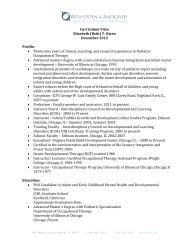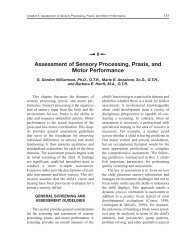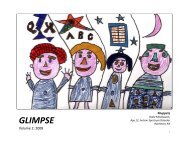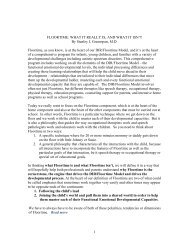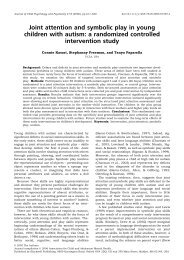Minding the Baby: A Reflective Parenting Program - Interdisciplinary ...
Minding the Baby: A Reflective Parenting Program - Interdisciplinary ...
Minding the Baby: A Reflective Parenting Program - Interdisciplinary ...
Create successful ePaper yourself
Turn your PDF publications into a flip-book with our unique Google optimized e-Paper software.
loved child, cherished by <strong>the</strong> extended family on both sides. When seen in <strong>the</strong> Strange Situation (Ainsworth,<br />
Blehar, Waters, & Wall, 1978), a laboratory based separation procedure that is used to assess infant attachment<br />
status, Noni was not classified as disorganized in relation to attachment (Main & Solomon, 1986), but showed<br />
many signs of a secure attachment; this is a crucial marker of developmental and relational consolidation. Mia is<br />
still an adolescent, one who has suffered a range of traumas in her short life. And yet, over <strong>the</strong> course of home<br />
visits, we see <strong>the</strong> effects of <strong>the</strong>se traumas diminishing in her day-today interactions with Noni. She finds<br />
pleasure in her, she plays with her, she inhibits her own instincts to frighten and overwhelm. She comforts her<br />
child and tolerates her distress. For <strong>the</strong> most part, Mia can hold Noni in mind.<br />
Despite Mia's continuing struggles, when we contrast her behavior with Noni at 4 months with <strong>the</strong> responsive<br />
and “good enough” mo<strong>the</strong>r we see now, it seems evident that <strong>the</strong> slow effort to help Mia keep Noni in mind has<br />
been successful, and we can feel somewhat confident that <strong>the</strong>re are protective factors in place for both Mia and<br />
Noni that will make a big difference in both of <strong>the</strong>ir developments. This in sharp contrast to Iliana, whose case<br />
we turn to next.<br />
Iliana<br />
We met Iliana, 19 years old, at a group prenatal class in <strong>the</strong> second trimester of her pregnancy. She was<br />
accompanied by <strong>the</strong> fa<strong>the</strong>r of her baby, a 20-year-old man with a previous history of substance abuse and<br />
incarceration. During <strong>the</strong> two-hour class Iliana remained attentive but maintained a skeptical distance from<br />
o<strong>the</strong>rs in <strong>the</strong> group. Indeed, distance and anger were to characterize Iliana's central struggles, both as <strong>the</strong>y were<br />
manifested internally and in relation to <strong>the</strong> team. In contrast to Mia, who from <strong>the</strong> beginning had some capacity<br />
to hold complex mental states in mind, Iliana was overtly more angry, more defended, and much less able to<br />
tolerate and describe her internal world. She had survived a childhood deeply marred by chaos, poverty, and<br />
violence. Her mo<strong>the</strong>r had left <strong>the</strong> family when Iliana was five. Her fa<strong>the</strong>r, deeply involved in drugs and alcohol,<br />
erratic and sometimes violent, had been her sole caregiver. She was sexually abused by her grandfa<strong>the</strong>r.<br />
However, <strong>the</strong> abandonment by her mo<strong>the</strong>r—of whom she spoke with bitterness and rage—was a defining<br />
moment for Iliana, a scar that would not heal. Iliana's defense against pain was to threaten and push away<br />
anyone who got close to her. She was proud of her toughness, her readiness to fight and establish her<br />
dominance on <strong>the</strong> street. She readily described herself as <strong>the</strong> kind of person who would act before she thought,<br />
and was clearly pleased at her capacity to frighten and intimidate people. At <strong>the</strong> same time, though, impending<br />
mo<strong>the</strong>rhood had stimulated—as it so often does—<strong>the</strong> wish to mo<strong>the</strong>r differently than she herself had been<br />
mo<strong>the</strong>red. Iliana wondered aloud if she could learn to be <strong>the</strong> kind of mo<strong>the</strong>r <strong>the</strong> baby could count on. “I know<br />
I've got to change and not just walk away or not talk when I'm mad. It's not just me and what I want anymore.”<br />
This snippet of mentalization, in which she linked her behavior to internal experience and recognized that her<br />
own intentions and desires were changing, was brief and fleeting. This was all we had to work with.<br />
When Iliana revealed her pregnancy to her fa<strong>the</strong>r and sisters she was told that she was “not fit to be a parent and<br />
was on her own.” She had only known <strong>the</strong> fa<strong>the</strong>r of <strong>the</strong> baby for several months and <strong>the</strong> pregnancy was<br />
unplanned. Their relationship was evidently troubled, although it was not until much later in <strong>the</strong> work that we<br />
knew just how troubled. She had little expectation of support from him (“maybe he'll buy diapers”) and<br />
obviously felt let down and alone. Despite leaving high school during 10th grade, Iliana was—like Mia—<br />
clearly an intelligent and articulate young woman. Also like Mia, she longed for work that would give her a<br />
sense of purpose and meaning.



